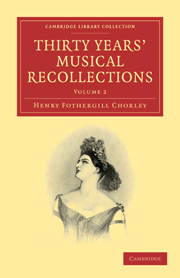Book contents
- Frontmatter
- Contents
- THE YEAR 1847
- THE YEAR 1848 (Her Majesty's Theatre.)
- THE YEAR 1848 (Royal Italian Opera.)
- THE YEAR 1849 (Her Majesty's Theatre.)
- THE YEAR 1849 (Royal Italian Opera.)
- THE YEAR 1850 (Her Majesty's Theatre.)
- THE YEAR 1850 (Royal Italian Opera.)
- THE YEAR 1851 (Her Majesty's Theatre.)
- THE YEAR 1851 (Royal Italian Opera.)
- THE YEAR 1852 (Her Majesty's Theatre.)
- THE YEAR 1852 (Royal Italian Opera.)
- THE YEAR 1853 (Royal Italian Opera.)
- THE YEAR 1854 (Royal Italian Opera)
- THE YEAR 1855 (Royal Italian Opera.)
- THE YEAR 1856 (Her Majesty's Theatre.)
- THE YEAR 1856 (Royal Italian Opera.)
- THE YEAR 1857 (Royal Italian Opera.)
- THE YEAR 1857 (Her Majesty's Theatre.)
- THE YEAR 1858 (Her Majesty's Theatre.—Royal Italian Opera.—Drury Lane.)
- THE YEAR 1859 (Royal Italian Opera.—Drury Lane.)
- The Last Chapter
THE YEAR 1856 (Royal Italian Opera.)
Published online by Cambridge University Press: 29 August 2010
- Frontmatter
- Contents
- THE YEAR 1847
- THE YEAR 1848 (Her Majesty's Theatre.)
- THE YEAR 1848 (Royal Italian Opera.)
- THE YEAR 1849 (Her Majesty's Theatre.)
- THE YEAR 1849 (Royal Italian Opera.)
- THE YEAR 1850 (Her Majesty's Theatre.)
- THE YEAR 1850 (Royal Italian Opera.)
- THE YEAR 1851 (Her Majesty's Theatre.)
- THE YEAR 1851 (Royal Italian Opera.)
- THE YEAR 1852 (Her Majesty's Theatre.)
- THE YEAR 1852 (Royal Italian Opera.)
- THE YEAR 1853 (Royal Italian Opera.)
- THE YEAR 1854 (Royal Italian Opera)
- THE YEAR 1855 (Royal Italian Opera.)
- THE YEAR 1856 (Her Majesty's Theatre.)
- THE YEAR 1856 (Royal Italian Opera.)
- THE YEAR 1857 (Royal Italian Opera.)
- THE YEAR 1857 (Her Majesty's Theatre.)
- THE YEAR 1858 (Her Majesty's Theatre.—Royal Italian Opera.—Drury Lane.)
- THE YEAR 1859 (Royal Italian Opera.—Drury Lane.)
- The Last Chapter
Summary
The destruction by fire of Covent Garden Theatre was the great opera event of this year:—one which was thought by many—perhaps hoped by a few to be—conclusive as to the fortunes or misfortunes of Italian Opera, in this country.—Though no terror was added to the catastrophe by the loss of life, the same was sufficiently dismal and startling.—Violent destruction, whether it befall a dancer at a ball,—or a place of amusement, which has been full of gay sights and sounds,—comprehends a contrast, which adds pain to every sight,—to every thought of wreck and disaster.
Perhaps, too, there are no ruins so haggard as those of a desolated theatre. That mysterious, ill-understood world behind the curtain, with all its inlets, and outlets, and contrivances, when it is rent into tatters, wears an aspect strange to those who have an eye for what is fantastic.—There is in Madame Dudevant's “Consuelo,” a grotesque and poetical study of the stage by daylight:—when the theatre is in prosperity and occupation.—By way of as match to it, a study of the ruins of a theatre, the morning after a fire, would make yet a more strange and suggestive picture.
To keep together the band, the chorus, and the principal artists, in the hope of better days, was all that was possible, and the Lyceum Theatre, being fortunately accessible, offered a shelter to the Royal Italian Opera. Some of the performances gained by transfer to the smaller locality—those, especially, of Signor Rossini's music—in which Madame Bosio distinguished herself by the grace and finish of her singing.
- Type
- Chapter
- Information
- Thirty Years' Musical Recollections , pp. 248 - 272Publisher: Cambridge University PressPrint publication year: 2009First published in: 1862

